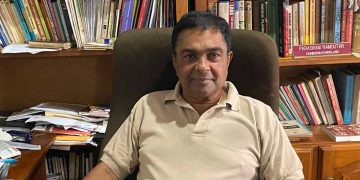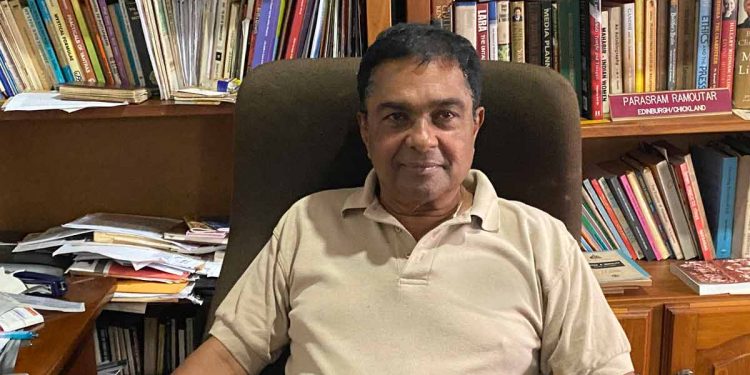From agricultural diplomacy in the mid-19th century, to vaccine diplomacy in the third decade of the 21st century, the bond between Trinidad and Tobago, and India has progressed, This is a befitting tribute as we observe the 176th Indian Arrival Day, May 30, 2021, not withstanding the fact that we are not beggars!
The Indian diaspora worldwide remains a powerful force in world history, whether its location is in Trinidad and Tobago, Suriname, Guyana, and Jamaica and in other parts of the Caribbean, or for that matter in Europe, United States, Canada, Fiji or Mauritius or elsewhere. We must always keep in the forefront of our minds at all times, that the Indian diaspora is not a myth, but a feature of humanity that has its original existence in a spiritual force, like all others.
We must not forget that over 148,000 East Indians were brought from India, principally Uttar Pradesh and Bihar, by the then British colonial government between the years 1845 to 1917 to rescue the ailing sugar, cocoa and coconut plantations, and their presence meant to enhance economic and financial security for the colony. Today, May 30, 2021, this colony has graduated to political independence, and after 59 years of our own management of the country, there are several issues of national development, the promotion of diversity in its fullest form, and equality for the Indian diaspora., remain elusive. The Indian diaspora was not a homeless community, but was spurned by the teachings of the great religion of Hinduism with its manifold religious texts—Ramayana, Bhagvad Gita, Mahabharat, the Puranas and the Vedas.
And after 59 years, the much- heightened talk for the establishment of the Mahatma Gandhi Centre for Cultural Co-operation which was inked in October 1968 between the late Indian and Trinidad and Tobago Prime Ministers, Indira Gandhi and Dr Eric Williams was a reality in December 2020.
The Indian diaspora regretfully missed Prof. H.S.Adesh who passed away last December after 54 years here giving out his best in Hinduism, Indian Philosophy, Music, Dance and other forms of cultural expose. He gave a regenerative initiative for the continued exploration and enhancement of Indian arts forms. His inputs demonstrated that the philosophy of multiculturalism or cultural diversity must be continued unabated, and there is an urgent need for increased financial support for all cultural activities with special emphasis on the Indian diaspora
Trinidad and Tobago, like India shares a seat at the United Nations, the Commonwealth of Nations and in several multilateral agencies, yet representations at these world institutions seldom reflect the total diversity of its national citizenry. The Indian diaspora continues to fight for recognition against long-held perceptions about Hinduism and its ancillary channels and culture.
Prime Minister Dr Keith Rowley, despite continuous complaints about full recognition of the Indian diaspora in housing, social and employment opportunities, was able to boast at the Global Indian Diaspora Conference at the Divali Nagar in March 2017 that although despite indentureship ended in 1917, most chose to remain in Trinidad and Tobago, “and for this, this nation is eternally grateful”.
For Indian Arrival Day in Trinidad and Tobago and beyond, the Indian diaspora must aggressively pursue excellence in science, business and politics as these ideals could better define the Indian identity and reinforce the virtues of their culture and values. The countries which have focused on, and built excellence have achieved better tolerance for cultural and ethnic differences, have laid stronger foundations for sustainable economic progress. Multi-ethnic countries need a model of a country that has achieved remarkable success with an emphasis on achieving excellence in all spheres of governance.
In multi-ethnic societies like Trinidad and Tobago, nation building remains elusive because there is too much concentration on building ethnic and cultural identities, rather than building an identity of excellence, as there is over emphasis on the distribution of the national cake to gain political advantage rather than a focus on creating a bigger cake through excellence and efficiency for distribution for slices to the total population,
In today’s Covid 19 environment, nations fail, not only because their leaders fail, but also because we fail at the individual and community levels. Nation building requires people and politicians to not only seek short term gratification, but to plan and strive for long term prosperity.
There is a need for a global consortium which could provide an institutional mechanism for co-operation among politicians and policy makers in small states. The Indian diaspora has the overwhelming capacity to provide leadership to give the impetus to achieving excellence in all areas.
Our story of real success in national development could be duplicated in the works of Rabindranath Tagore, Mahatma Gandhi, Jawaharlal Nehru, Martin Luther King, Nelson Mandela, Mother Teresa, among several other notables.
The continued existence of Trinidad and Tobago must be duplicated in the teachings of these great leaders, because if we do not learn, our reality as a people will not be shaped by reason, but by leaders who take would take us to the abyss.
Then Minister of Foreign Affairs, Winston Dookeran in a message, in the book, “India in the Caribbean”, initiated and coordinated by former Indian High Commissioner, Shri Gauri Shankar Gupta in 2015, Mr. Dookeran writes: “As with other diasporas, the Indian community does have an affinity with India. That affinity was kept alive by films, letters and ties of kinship. The earlier generations, understandably were more nostalgic. Globalization, today however, is triumphant. With growing convergence among nations and states, nostalgia will recede and some memories lost. While not losing their heritage, the Indian community is first and foremost part and parcel of the citizenry of Trinidad and Tobago. The journey was long, at times arduous and difficult, but always inspiring, in discovery of a newCaribbean identity”.

































































